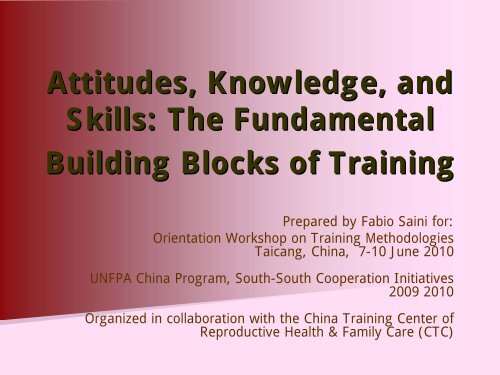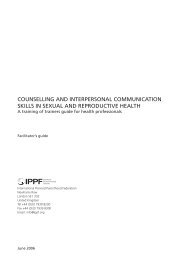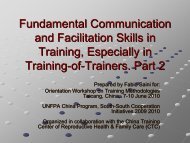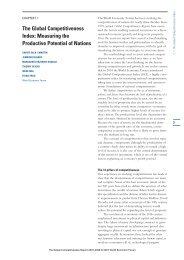Attitudes, Knowledge, and Skills: The Fundamental Building Blocks ...
Attitudes, Knowledge, and Skills: The Fundamental Building Blocks ...
Attitudes, Knowledge, and Skills: The Fundamental Building Blocks ...
Create successful ePaper yourself
Turn your PDF publications into a flip-book with our unique Google optimized e-Paper software.
<strong>Attitudes</strong>, <strong>Knowledge</strong>, <strong>and</strong><br />
<strong>Skills</strong>: <strong>The</strong> <strong>Fundamental</strong><br />
<strong>Building</strong> <strong>Blocks</strong> of Training<br />
Prepared by Fabio Saini for:<br />
Orientation Workshop on Training Methodologies<br />
Taicang, China, 7-10 June 2010<br />
UNFPA China Program, South-South Cooperation Initiatives<br />
2009 2010<br />
Organized in collaboration with the China Training Center of<br />
Reproductive Health & Family Care (CTC)
<strong>Attitudes</strong><br />
�� <strong>Attitudes</strong> are the established ways of<br />
responding to people <strong>and</strong> situations that<br />
we have learned, based on the beliefs,<br />
values <strong>and</strong> assumptions we hold. How we<br />
respond to situations, <strong>and</strong> our behavior<br />
can reflect our attitude
<strong>Knowledge</strong><br />
�� <strong>The</strong> definition of knowledge can vary depending<br />
on the theory of knowledge creation that a<br />
person chooses to follow. However, as one of<br />
the aim of training is to improve performance<br />
<strong>and</strong> quality, knowledge needs to be considered<br />
both as the required information to perform a<br />
task as well as the capacity to apply it back in<br />
the work situation. situation<br />
Adapted from:<br />
http://www.google.co.th/search?q=exploring+attitudes+knowledge+skills+SRH++tr<br />
http://www.google.co.th/search?q=exploring+attitudes+knowledge+skills+SRH++tr<br />
aining&rls=com.microsoft:*:IE-SearchBox&ie=UTF<br />
aining&rls=com.microsoft:*:IE SearchBox&ie=UTF-8&oe=UTF 8&oe=UTF-<br />
8&sourceid=ie7&rlz=1I7SNYN_en-GB<br />
8&sourceid=ie7&rlz=1I7SNYN_en GB
<strong>Skills</strong><br />
� <strong>Skills</strong> are defined as expertness, practiced ability, facility in<br />
doing something, dexterity <strong>and</strong> tact. Skill encompasses<br />
experience <strong>and</strong> practice, <strong>and</strong> the gaining of skill leads to<br />
unconscious <strong>and</strong> automatic actions. Skill is more than just<br />
the following of rule-based actions. <strong>The</strong> potential downside<br />
of such an attribute is that, in the absence of knowledge<br />
<strong>and</strong> attitudes, such a "skilled" person may have no ability or<br />
capacity to react to situations outside the normal condition,<br />
i.e. skills alone without knowledge <strong>and</strong> attitudes can be<br />
dangerous.<br />
Adapted from:<br />
http://www.google.co.th/search?q=exploring+attitudes+knowledge+skills+SRH++training&rls=com.mi<br />
http://www.google.co.th/search?q=exploring+attitudes+knowledge+skills+SRH++training&rls=com.mi<br />
crosoft:*:IE-SearchBox&ie=UTF<br />
crosoft:*:IE SearchBox&ie=UTF-8&oe=UTF 8&oe=UTF-8&sourceid=ie7&rlz=1I7SNYN_en<br />
8&sourceid=ie7&rlz=1I7SNYN_en-GB GB
Case study<br />
� You have been asked to be part of a team to train health<br />
providers working in family planning clinics to integrate HIV<br />
prevention in their services. Most of the providers have<br />
excellent medical background <strong>and</strong> good skills in clinical<br />
procedures, but very limited experience in addressing<br />
sexuality <strong>and</strong> communication issues with clients. In addition,<br />
most of the providers are used to receiving lectures <strong>and</strong><br />
have not had opportunities to participate in learner-centered<br />
<strong>and</strong> experiential training. You have also just found out that<br />
most of the clients they see are married women.
Let’s discuss<br />
1. What attitudes would be important to explore with<br />
these providers during training, <strong>and</strong> why?<br />
2. What new knowledge would you introduce in the<br />
training, <strong>and</strong> why?<br />
3. If you didn’t explore attitudes of providers about the<br />
topics you plan to introduce, what could happen?<br />
4. What skills would you aim to help them develop?<br />
5. If your training didn’t help providers develop awareness<br />
of their attitudes <strong>and</strong> the potential impact on service<br />
provision, what could happen during the training? And<br />
What could happen when the providers go back to work?






